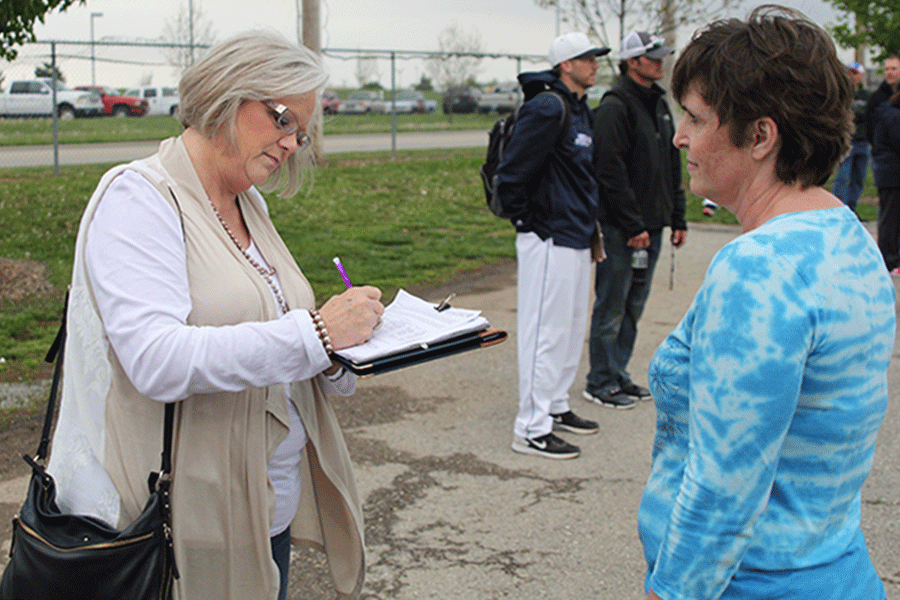Recall petition leads to potential for legal action by Board of Education member
An attorney for Board member Scott Hancock reserved Hancock’s right to sue a committee attempting to recall him from his position
By Justin Curto
At a De Soto High School baseball game, district resident Julianne Wright collects a recall petition signature from another resident on Friday, April 24.
April 30, 2015
An attorney for Board of Education member Scott Hancock has notified a committee attempting to recall Hancock that it may face legal action for publishing defamatory content in its recall petition.
Attorney Wilson Stafford, who represents Hancock, sent a letter to the committee on Monday, April 13, making it aware of Hancock’s right to sue but not filing a lawsuit for what Stafford’s letter calls “false and defamatory accusations.”
“These are feckless, unsubstantiated, anonymous and wholly unverified allegations which have been categorically denied by Mr. Hancock,” Stafford said via email. “Given the failure of the committee to withdraw their petition, Mr. Hancock has simply and expressly reserved the legal rights he has under the law.”
The letter gave the committee a chance to withdraw the petition by Thursday, April 23, however no legal action has been taken since that deadline. Attorney Joseph Hatley, representing the recall committee of district residents Anh-Nguyet Nguyen and Julianne Wright and former district teacher Karen Wall, sent a reply to Stafford on Wednesday, April 22, saying the committee will not withdraw the petition and has a right to seek a recall and criticize Hancock.
Hancock and Nguyen both declined comment, leaving their attorneys to respond to questions from the media.
The accusations detailed in the petition against Hancock mainly include those of harassment and sexual harassment. The petition includes quotes alleging Hancock violated federal sexual harassment laws through “offensive comments about women in general.” It additionally says Hancock “has made it his intention ‘to get rid’” of superintendent Dr. Doug Sumner, who resigned in February, and repeatedly called administrators before Board meetings in ways that are “harassing and belittling,” which the petition argues violates federal harassment laws.
Even the potential for a lawsuit against the recall committee surprised Hatley.
“The only reason I’m involved is because Mr. Hancock threatened to sue,” Hatley said via phone. “It’s absolutely astounding to me that a public official would threaten to sue constituents just for criticism.”
University of Kansas journalism and law lecturer and attorney Mark Johnson said the only way Stafford and Hancock could prove defamation is if the committee members knew they were publishing false information on the petition or had reason to believe the information was not true when they made the petition. According to Johnson, the petition’s information only needs to have “substantial truth” to be protected under the First Amendment.
“People who make accusations about public officials have certain protections under the First Amendment,” Johnson said via phone. “If the accusations are substantially true, then that’s good enough.”
With this, Johnson said Stafford shouldn’t follow through with a lawsuit against the recall committee.
“I think the guy would be ill advised to sue,” Johnson said. “He’s not going to win. I don’t think it makes sense for him to sue.”
Though he may not sue, Stafford said the petition should have been required to include confirmed allegations against Hancock and sees the recall petition as the committee’s way of responding to Sumner’s resignation, which the petition argues Hancock contributed to.
“I believe any rational and fair-minded person would insist on more than anonymous and unverified allegations of federal law violation before acting in support of the recall petition being circulated,” Stafford said. “The effort to recall Mr. Hancock appears to be the culmination of a misguided attempt to find a political scapegoat for the voluntary resignation of a popular school district superintendent.”
Before finishing writing the petition, the committee did verify their allegations, according to Wall.
“We made sure that our charges were valid and were validated by people who had witnessed his behavior in open, public meetings or had experienced his harassment and bullying behavior themselves,” Wall said via email. “There is no vendetta on our part, only a strong desire to maintain the excellence of USD 232 and to ensure that this unacceptable behavior will no longer be tolerated within our school system.”
Hatley said voters should be the ones to confirm or deny the allegations in the petition by voting in a recall election, should the petition lead to one.
“It’s what the election is all about,” Hatley said. “People get out there and they state their point of view.”
In order for the recall petition to go to an election, it must have at least 1,000 valid signatures by 90 days after its approval. The petition has over 1,200 signatures as of Wednesday, April 29, and the committee will collect signatures for one more week before filing, according to Nguyen. After the committee files the petition and the required amount of signatures are validated, a recall election will be scheduled within 60-90 days where district residents can vote on whether to recall Hancock from office or retain him.
Worried about the district’s future, paraprofessional Debbie Likes signed the petition Thursday, April 23, at a signing event at her daughter’s house. In addition to signing events at residents’ homes, petition sponsors have gone to local restaurants and businesses and community functions to publicize the petition and gain signatures.
“I’m concerned about the integrity of our school board and the protection of those who serve,” Likes said. “I’m not accusing anybody particularly of any crimes. I am saying that if protocol is not followed in a Board meeting and it isn’t stopped, and when someone makes comments that are hurtful and derogatory, that shouldn’t be allowed.”
Hatley encouraged residents to sign the petition, or at least converse about it, because of how he believes Hancock affects the district.
“There’s evidence out there that [Hancock is] effectively harassing and belittling staff, keeping people from doing their jobs,” Hatley said. “If you’re losing administrators because you’ve got an overzealous Board member … then that’s something the voters should be talking about.”
Stafford still questions this evidence.
“Members of the recall committee have denounced and vilified Mr. Hancock for alleged actions and behavior they freely admit they have not witnessed,” Stafford said. “Because they can, members of the recall committee have leveled very public attacks on the character and public service of Mr. Hancock based upon rumor, hearsay and innuendo.”




![At a signing gathering on Wednesday, April 15, district resident Stephanie Sharp fills out a petition supporting the recall of Board of Education member Scott Hancock. “I care about the school district and I’m familiar with how Mr. Hancock has handled himself,” Sharp said. “[I] want to make sure that we have the most responsive and professional public servants serving our students and patrons that we can and that’s not what’s happening now.”](https://www.mvnews.org/wp-content/uploads/2015/04/FOR-WEB_20150415_0019-300x200.gif)







